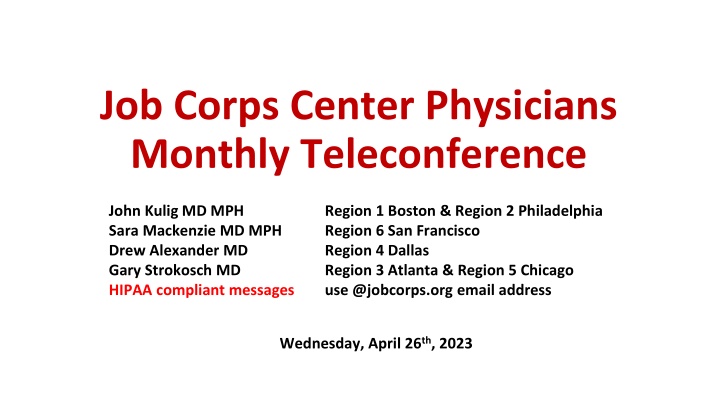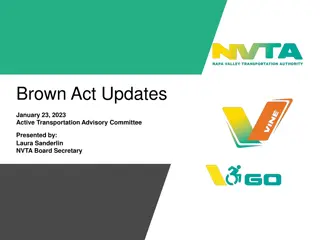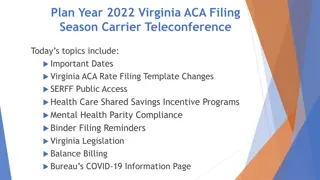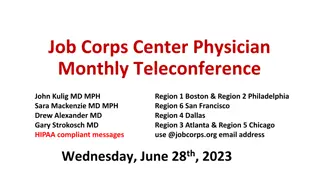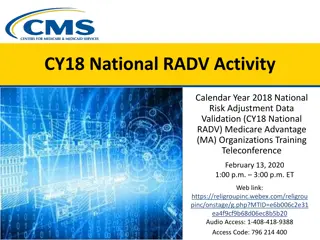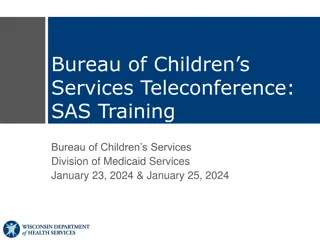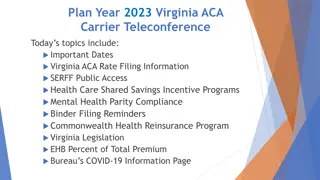Monthly Teleconference
Job Corps Center Physicians Monthly Teleconference with John Kulig MD MPH, Sara Mackenzie MD MPH, Drew Alexander MD, and Gary Strokosch MD discussing CDC Genomic Surveillance, New Omicron Variant XBB 1.16, community transmission, Job Corps student mortality data, and staff preparedness for student drug overdose. Stay informed about the latest updates and recommendations in healthcare.
Download Presentation

Please find below an Image/Link to download the presentation.
The content on the website is provided AS IS for your information and personal use only. It may not be sold, licensed, or shared on other websites without obtaining consent from the author.If you encounter any issues during the download, it is possible that the publisher has removed the file from their server.
You are allowed to download the files provided on this website for personal or commercial use, subject to the condition that they are used lawfully. All files are the property of their respective owners.
The content on the website is provided AS IS for your information and personal use only. It may not be sold, licensed, or shared on other websites without obtaining consent from the author.
E N D
Presentation Transcript
Job Corps Center Physicians Monthly Teleconference John Kulig MD MPH Sara Mackenzie MD MPH Drew Alexander MD Gary Strokosch MD HIPAA compliant messages use @jobcorps.org email address Region 1 Boston & Region 2 Philadelphia Region 6 San Francisco Region 4 Dallas Region 3 Atlanta & Region 5 Chicago Wednesday, April 26th, 2023
New Omicron Variant XBB.1.16, a new variant, is increasing across the country and appears to spread more easily than previous variants. The bivariant booster vaccine and the antiviral medication Paxlovid remain effective at reducing disease severity. New symptom with the XBB.1.16 variant is conjunctivitis (red, itchy eyes). Be on the lookout and test for COVID-19 if a student presents with conjunctivitis and any of the usual COVID symptoms - runny nose, sore throat, fever, cough, etc. Continue to encourage and provide access to the bivariant booster COVID-19 vaccine if not yet received by the student.
Community levels COVID-19 Community Levels were calculated on Thursday Apr 20 2023
Community transmission New cases per 100,000 in past 7 days: High > 100 Positive NAAT tests in past 7 days: High > 10% Current 7-days is Apr 13 2023 - Apr 19 2023 for case rate and Apr 11 2023 - Apr 17 2023 for percent positivity.
Job Corps Student Mortality: Preliminary Data PY 2022 Cause of death Count July 1, 2022 to date 7* 58% Drug and alcohol 3 25% Homicide 1 9% Suicide 1 9% Medical 0 - Unintentional injury 0 - Unknown 12 100% Total *Three on-center & four off-center. Six male. One female.
Staff Preparedness for Student Drug Overdose Staff training: CPR/First Aid Recognition of substance use symptoms Administration of Narcan Staff knowledge: Location of emergency kits with Ambu bags on center Location of automated external defibrillators (AEDs) on center Location of nearest Narcan multiple sites on center, center vehicles Note that Narcan nasal spray can be administered as one squirt every 2 to 3 minutes until EMS arrives. Narcan is not harmful, even when not clinically indicated, as with a non-opioid overdose.
Medication Assisted Treatment (MAT) for Opioid Use Disorder November 18, 2016 DIRECTIVE: JOB CORPS PROGRAM INSTRUCTION NOTICE NO. 16-21 Medication Assisted Treatment (MAT) for Opioid Addiction in Job Corps Centers need to consider the logistics of the individual s MAT participation as it relates to Job Corps program requirements. MAT will occur off center because Job Corps does not provide addiction treatment services or long-term therapy. Options: Daily methadone by mouth licensed clinics only Daily sublingual buprenorphine/naloxone Buprenorphine/naloxone subdermal implant 6 months Monthly naltrexone intramuscular injection
Controlled Substances in Lockboxes Centers may choose to dispense controlled substances exclusively in the Wellness Center, but . . . Storage of controlled substances in the student lockboxes is NOT prohibited Quantities of medication in the lockboxes should be limited to a 7- day supply with resupply and collection of the Controlled Medication Observation Record (CMORs) weekly Controlled substances on center are almost exclusively psychostimulant medications for ADHD Weekend dosing may not be needed if not driving or studying
Getting the Conversation Started Assess your own comfort by discussing sex with various patient groups. Identify any biases that you may have. If you are uncomfortable talking about sex and sexuality, your patient will be too. Avoid making assumptions about your patient based on age, appearance, marital status, or any other factor. Gather your patient s basic information during the initial clinic assessment. This includes their name, pronouns, sexual orientation, and gender identity. For gender identity, incorporate a two-step method into the assessment. Ask for their sex assigned at birth (female, male, or decline to answer) and then current gender identity (female, male, transgender female, transgender male, gender diverse, additional gender category, or decline to answer).
Getting the Conversation Started Ask for correct pronouns and terminology. Use the pronouns they share and support the patient s current gender identity, even if their anatomy does not match that identity. Use neutral and inclusive terms such as partner. Make your patient feel comfortable by establishing a rapport before asking sensitive questions. Ask other people to step into the waiting room while you talk with your patient privately. Family members should not serve as interpreters.
Keeping the Conversation Going Let your patient know that you ask everyone these questions. Transition into asking sensitive questions. Pose your questions in a non-judgmental manner. Try not to react overtly, even if you feel uncomfortable or embarrassed. Pay attention to your body language and posture. Rephrase your questions or briefly explain why you are asking a question if a patient seems offended or reluctant to answer. Ensure that you and your patient share an understanding of the terms being used, to avoid confusion. If you are not familiar with a term your patient used, ask for an explanation.
Partners Are you currently having sex of any kind oral, vaginal, or anal with anyone? (Are you having sex?) If no, have you ever had sex of any kind with another person? In recent months, how many sex partners have you had? What is/are the gender(s) of your sex partner(s)? Do you or your partner(s) currently have other sex partners?
Practices I need to ask some more specific questions about the kinds of sex you have had over the last 12 months to better understand if you are at risk for sexually transmitted infections or STIs. Would that be OK? We have different tests that are used for the different body parts that people use to have sex. What kinds of sexual contact do you have, or have you had? What parts of your body are involved when you have sex? Do you have genital sex (penis in the vagina)? Anal sex (penis in the anus)? Oral sex (mouth on penis, vagina, or anus)? Are you a top and/or a bottom? Have you or any of your partners used drugs? Have you exchanged sex for your needs (money, housing, drugs, etc.)?
Protection from STIs Do you and your partner(s) discuss STI prevention? If you use prevention tools, what methods do you use? (For example, external or internal condoms also known as male or female condoms dental dams, etc.) How often do you use this/these method(s)? More prompting could include specifics about: Frequencies: sometimes, almost all the time, all the time. Times they do not use a method. If sometimes, in which situations, or with whom, do you use each method? Have you received human papilloma virus (HPV), hepatitis A, and/or hepatitis B vaccine shots? Are you aware of pre-exposure prophylaxis or PrEP, a medicine that can prevent HIV infection? Have you ever used it or considered using it?
Past History of STIs Have you ever been tested for STIs and HIV? Would you like to be tested? Have you been diagnosed with an STI in the past? When? Did you get treatment? Have you had any symptoms that keep coming back? Has your current partner or any former partners ever been diagnosed or treated for an STI? Were you tested for the same STI(s)? Do you know your partner s (or partners ) HIV status?
Pregnancy Intention Do you think you would like to have (more) children at some point? When do you think that might be? How important is it to you to prevent pregnancy (until then)? Are you or your partner using contraception or practicing any form of birth control? Would you like to talk about ways to prevent pregnancy? Do you need any information on birth control?
Announcement Guest speaker next month: Tamara Warner, PhD Regional Mental Health Specialist Dallas, San Francisco Introduction to Trauma Informed Care
Open Forum https://www.surveymonkey.com/r/PQX3J6P
Job Corps Center Physicians Monthly Teleconference Next call: Wednesday, May 24, 2023 John Kulig MD MPH Sara Mackenzie MD MPH Drew Alexander MD Gary Strokosch MD HIPAA compliant messages Region 1 Boston & Region 2 Philadelphia Region 6 San Francisco Region 4 Dallas Region 3 Atlanta & Region 5 Chicago use @jobcorps.org email address https://www.surveymonkey.com/r/PQX3J6P
